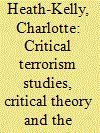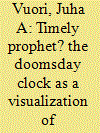|
|
|
Sort Order |
|
|
|
Items / Page
|
|
|
|
|
|
|
| Srl | Item |
| 1 |
ID:
097739


|
|
|
|
|
| Publication |
2010.
|
| Summary/Abstract |
This article problematizes how Critical Terrorism Studies (CTS) utilizes Coxian and Frankfurt School Critical Theory to support an emancipatory project. The article broadly takes the example of CTS to illustrate the dangers of the 'pearl fishing' method, occasionally used within critical international relations, where a section of a philosophical position is appropriated without regard for the whole. As Horkheimerian Critical Theory relies upon a far broader philosophy than CTS acknowledges, it is argued that the appropriated emancipatory foundation cannot make sense in soundbite form. Such stunted interaction with the wider philosophy of Critical Theory leaves CTS susceptible to the charge of logical error, specifically that contained in the 'naturalistic fallacy'. The naturalistic fallacy is a charge drawn from the philosophy of logic that takes improper derivation of 'ought' from 'is' within argumentation as its referent. The relationship between international relations and Critical Theory does not have to be so unsatisfactory, however, and this article concludes with suggestions for a route whereby emancipatory commitment might be adopted without such problems of normative origination.
|
|
|
|
|
|
|
|
|
|
|
|
|
|
|
|
| 2 |
ID:
097741


|
|
|
|
|
| Publication |
2010.
|
| Summary/Abstract |
In ongoing discussions surrounding the issue of human security, the security of individuals has become entangled in conceptual debates that are preoccupied with notions of appropriate variables, measurements and issue areas. This article suggests and illustrates a basis for human security research that is distinct from such objectivist empiricism. A case study of crisis centres in northwest Russia is used to demonstrate that human security is not only a matter for objectified generalizations, but also a question of practices. Feminist security theory and the work of Pierre Bourdieu are used to address methodological concerns raised during fieldwork on crisis centres in northwest Russia. Three dimensions are discussed: the conceptualization of security for the specific-actor approach of crisis centres, the ways in which relevant empirical data are established, and the subsequent interpretation of such data. The discussion shows, first, that rethinking security for crisis centres reveals contingencies in the research process that are relevant to the establishment of human security knowledge; second, the practice of human security research reflects the fragility in the understanding and production of security in everyday contexts. Accordingly, when we examine human security, our analysis ought to be directed at security as an ambiguous practice.
|
|
|
|
|
|
|
|
|
|
|
|
|
|
|
|
| 3 |
ID:
097743


|
|
|
|
|
| Publication |
2010.
|
| Summary/Abstract |
This article argues that an explanation of China's stance on a possible international intervention in Darfur cannot eschew considering the wider context of the ongoing dialectics of normative change and contestation surrounding the progressive redefinition of norms of intervention since the early 1990s. It suggests that by emphasizing the need to respect Sudan's sovereignty and the requirement that Sudan consent to an international intervention, China has sought to promote a return to more traditional forms of peacekeeping, as a way to oppose emerging interpretations of the norm of intervention, which it sees as a threat to its own security. Such an interpretation challenges the accusations of foot-dragging of which China has been the object. The hypothesis is tested by analysing China's voting and declaratory record in the Security Council, and assessed against the country's historical record on peacekeeping discussions in the Council. Embracing Finnemore's argument that multilateral intervention represents the pillar of the post-Cold War international order, the article concludes by relating China's norm-brokering effort to its asserted interest in reshaping the international system.
|
|
|
|
|
|
|
|
|
|
|
|
|
|
|
|
| 4 |
ID:
097740


|
|
|
|
|
| Publication |
2010.
|
| Summary/Abstract |
There have been numerous calls to include images in the analysis of securitization and the social construction of security issues. The present article answers these calls by examining a longstanding process of securitization in which speech acts have been interwoven with a powerful symbol. Looking into the past and a visualization of possible futures, the article traces the resets of the so-called Doomsday Clock of the Atomic Scientists as securitization/desecuritization moves with a global referent object. While the Scientists' securitization arguments have pleaded to rationality, the symbol of the Clock has worked to evoke people's sensibilities. The article reasons that while images and symbols can facilitate, or impede, securitization moves, it is difficult to fathom how images, without anchorage, could bring about securitization that would not have been institutionalized previously.
|
|
|
|
|
|
|
|
|
|
|
|
|
|
|
|
| 5 |
ID:
097742


|
|
|
|
|
| Publication |
2010.
|
| Summary/Abstract |
Post-conflict cities represent a laboratory in which to explore the substate orientation of security. Based on an analysis of developments in Baghdad, Basra and Falluja since 2003, this article argues not only that security is inherently selective, but also that the exclusionary actions of local or sectarian groups are more influential than those of state-based agents or projects based on security for the individual. The notion of security can accommodate multiple interpretations, but in practice a dominant discourse controls its meaning, and negotiation soon develops into patterns of domination and exclusion. This typically leads to a 'ghettoization' of security, whereby specific groups are secure only in specific areas. Security thus reflects the sum of myriad local arrangements. The key issue, therefore, is not whether there can be security for all, but the nature of the concessions made by substate and state-based types of security, and the contrast between them and models based on security for the individual.
|
|
|
|
|
|
|
|
|
|
|
|
|
|
|
|
|
|
|
|
|